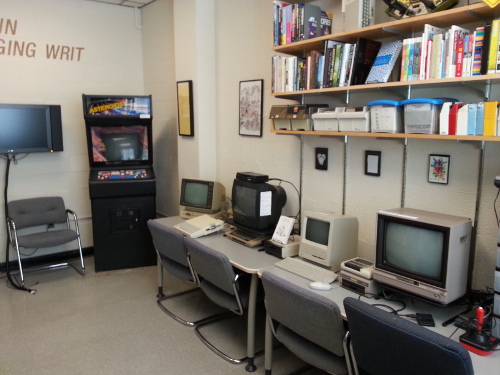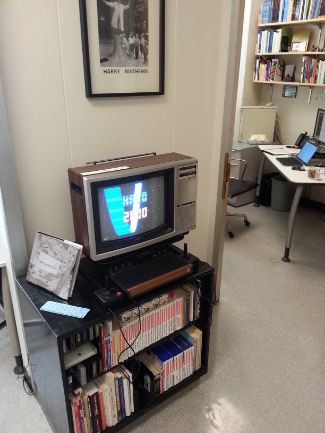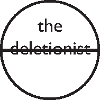
I direct a lab at MIT called The Trope Tank. This is a lab for research, teaching, and creative production, located in building 14 (where the Hayden Library is also housed), in room 14N-233. Its mission is to develop new poetic practices and new understandings of digital media by focusing on the material, formal, and historical aspects of computation and language.

The Trope Tank is a physical facility with unusual material computing resources from the past few decades – as well as places for researchers to sit and work with their more modern computers. The facility and materials provide for visits from classes, discussions with visiting researchers, and support for creative and research projects. The lab space continues to house the monthly meetings of the People’s Republic of Interactive Fiction, the Boston Area’s local IF group. Trope Tank equipment has supported talks this year at the Boston Cyberarts Gallery, Microsoft Research in Redmond, UCLA, the University of Maine, and other venues.
This academic year, two Trope Tank affiliates are becoming faculty members:
– Clara Fernández-Vara, who took part in the Tools for the Telling project back in 2007-2008 and has been a visiting scholar at the Trope Tank this year, is joining the faculty of NYU’s Game Center at the end of summer as an associate arts professor.
– Amaranth Borsuk, who was guest organizer of the Purple Blurb series in 2011-2012 and is a current collaborator on _The Deletionist_, is joining the faculty of The University of Washington, Bothell as an assistant professor. She has been a senior lecturer there.
The Trope Tank’s series of technical reports, called the “Trope Report” series, now features five items and is archived in MIT’s DSpace.
There have been two major research projects (both with artistic aspects) and one creative, poetic project this past year:
– The book 10 PRINT CHR$(205.5+RND(1)); : GOTO 10 was published last year by the MIT Press (and is also available for free download as a PDF). Various subsets of the ten authors have been doing presentations related to the book in many different contents.
– The story generation project Slant was initiated and the first paper was accepted at ICCC 2013. It will be presented there, in Sydney, next month. The project involves integrating or developing new work based on decades of research by Nick Montfort, Rafael Pérez y Pérez, and Fox Harrell; those three and Andrew Campana have collaborated to initiate the project.
– The Deletionist is a current poetic project by Amaranth Borsuk, Jesper Juul, and Nick Montfort which will premiere at E-Poetry next month at Kingston University, London.
The Trope Tank will continue to support research, creative work, and teaching this summer and beyond. This is a laboratory to allow people to work with material computing systems; while it is not an archive, museum, or library, and does not offer all that such institutions do, it does provide for hands-on access to the history of creative computing. If you are interested in using the systems and materials in the Trope Tank, please contact Nick.








